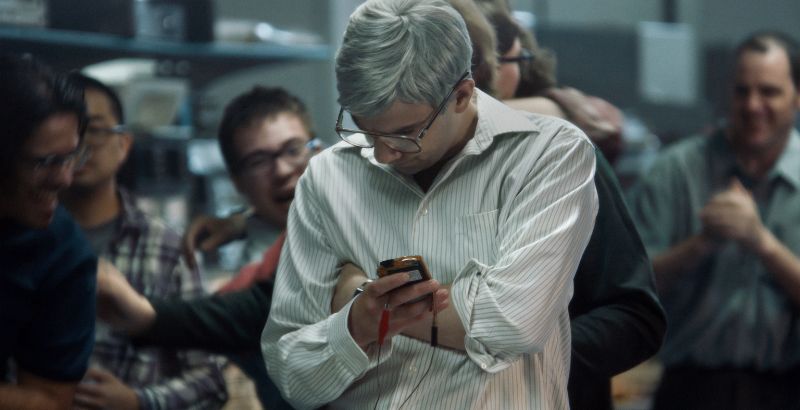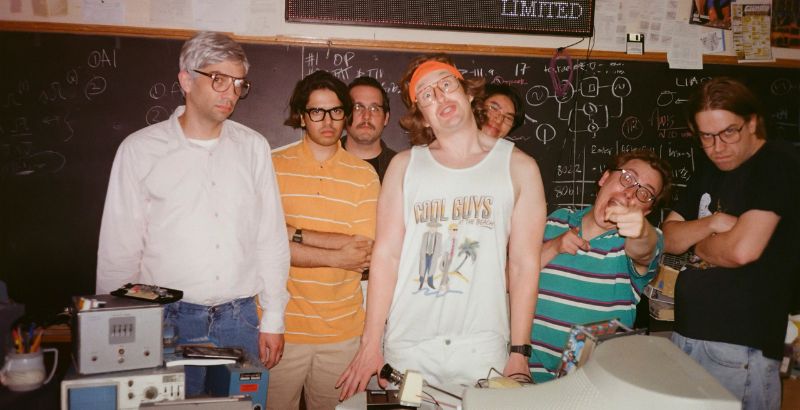
Although I’ve never been interested in technology trends, I distinctly remember when BlackBerry phones started popping up everywhere (with their big keyboards, it was kind of difficult to miss them). But then, they all suddenly disappeared and those few users who remained loyal were subjected to mocking at school. How did that happen? How did such a massively popular and, at the time, innovative product go from a symbol of status to a bullying lighting rod? Director Matt Johnson gives us the answer in BlackBerry, an thoroughly enthralling biopic about the rise and fall of this mobile phone.
BlackBerry starts in 1996, the day tech expert Mike Lazaridis (Jay Baruchel), alongside best friend Doug Fregin (Matt Johnson), meets irritable capitalist suit Jim Balsillie (Glenn Howerton) to try to sell his innovative idea: a phone with computer capabilities. Although there’s some doubt at the start, Mike and Jim seem to be the perfect pairing for this venture: introverted Mike takes care of the tech side while ambitious Jim handles business. The company (Research in Motion) soon takes off, but as we all know success eventually runs dry. And the journey to get there is fascinating.
Johnson’s DIY-esque direction style works wonders for this story and elevates it beyond your typical tech drama story. With vibes of The Office, the shaky cam and hyperactive cinematography give BlackBerry energy as well as a comedic edge that creates a mockumentary atmosphere around the office setting; abundant zooms are used to highlight emotions, add humor, and land home the personality of certain characters. Furthermore, you’ve got old-school screensavers, Doom gameplay, LAN parties, They Live references, and other world-building details that brilliantly illustrate the time and place of the story.
If you haven’t felt the The Social Network vibes, you eventually will, thanks to Jay McCarrol’s electronic score that adds to the frantic nature of a film whose pace is used to captivate and embody the speed at which technology evolves. This creates the perfect landing pad for the third act as this fast technologic wave soon catches up with Mike and Jim, whose narcissistic traits are gradually revealed throughout the film.

Based on the book Losing the Signal: The Untold Story Behind the Extraordinary Rise and Spectacular Fall of BlackBerry, the script, adapted by Johnson and Matthew Miller, has twists, strong character development, and a meaningful focus on the clash between innovation and money. The abundant use of complex technological and financial verbiage might be a tad overwhelming in some instances, but it creates authenticity around the actions of the characters. And although lacking in depth, the moral aspects of the story, explored through Mike and Doug’s relationship, add an interesting layer to the film.
Jay Baruchel (Random Acts of Violence) is fantastic as an introvert whose good nature is slowly corrupted by success and ego, and most importantly, he expertly avoids the now typical “genius tech expert” tropes that plague these types of projects. As Doug, Johnson is key in creating contrast between the increasingly serious personality of his best friend and the fun work environment that he once took part in. Glenn Howerton (Always Sunny in Philadelphia) might be the best part of the film; without ever becoming a one-dimensional evil figure, he completely embodies your typical white American capitalist ready to take anyone and everything to earn more money; his powerful outbursts and his ruthless attitude command attention while also highlighting the nastiness behind the capitalist mindset.
It’s common to think that BlackBerry was simply annihilated by Apple’s iPhone. Still, Matt Johnson gives us an absorbing tale that sees beyond the importance of innovation in tech culture and ruminates on corporate culture and how that can consume your true self.
BlackBerry opens in theaters on May 12 through IFC Films.
BlackBerry
-
Rating - 8/108/10
TL;DR
It’s common to think that BlackBerry was simply annihilated by Apple’s iPhone. Still, Matt Johnson gives us an absorbing tale that sees beyond the importance of innovation in tech culture and ruminates on corporate culture and how that can consume your true self.






